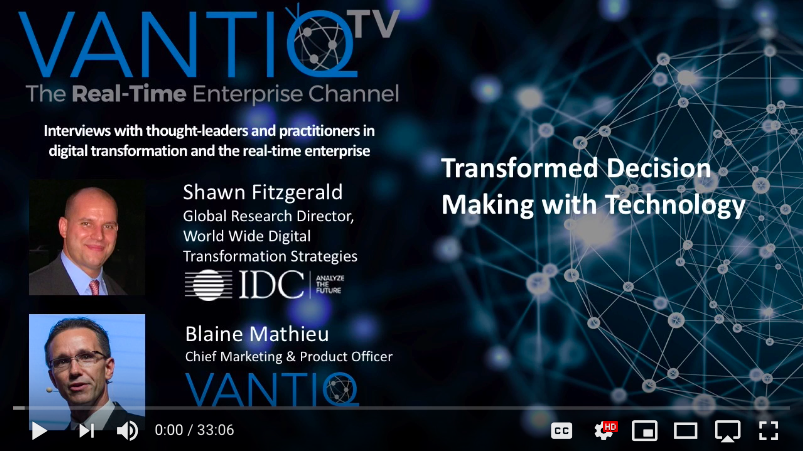Shawn Fitzgerald, Global Research Director, World Wide Digital Transformation Strategies at renowned technology consulting and analyst firm, IDC, was a guest on VANTIQ TV’s The Real-Time Enterprise.
What follows are some takeaways from the conversation. You can watch the complete interview here.
Blaine: Tell us about the digital transformation practice at IDC. I think you refer to it as the “DX practice”.
Shawn: Digital transformation or DX at IDC is a program that’s been around about 3 years. I’ve had the opportunity to be running that program the last two years I joined IDC. In that span, we’ve created an industry-leading position of thought leadership around what is digital transformation, what it means for companies to actually undertake transformations. I think we’re up to now 18 industry use case taxonomies spanning well over 800 use cases or think of them as business projects with business-oriented outcomes that utilize key technologies that are part of our digital world today.
Blaine: I always ask our guests to give their opinion of what digital transformation actually really means. Finally, I’ve got the analyst and guru who is literally leading the digital transformation practice. So, what does digital transformation mean to you?
Shawn: I’m really glad you asked that, Blaine because quite frankly, I hear everybody say, “Digital transformation is a tired term. It’s an overused term.” I don’t think the term is tired or overused. I think the lack of context and scoping of what the term means is the failing that industry and society at large is really suffering from as it relates to the term.
At IDC, we define digital transformation as transform decision making with technology. Some of our research recently, I did a CFO series and it was fascinating to hear these CFOs talk about anywhere from 60 to 80 percent of the time that the organization spends is agreeing to a shared set of information to then make a decision around. The ability to use technology to automate the information that everybody can agree to gets you to a decision and a better outcome sooner.
“Change management is a function of altering habit. Habit is just a pre-programmed behavior set. In order to change that pre-programmed behavior set and get these new habits of digital, you have to practice those every day.”
– Shawn Fitzgerald
Blaine: Do you have any favorite examples of companies that you’re maybe working with now or have worked with or organizations that are actually making the transition toward being digitally transformed, so to speak?
I often use the Schindler elevator company as a great example. I jokingly refer to [it as] a company that lifts things up and puts them down. But, several years ago, they decided to IoT enable a lot of their elevators and escalators and other hard assets so that they could monitor and improve maintenance up time. So, you go from outages of a couple of days to several hours because they can remotely monitor the asset performance.
What they found is by aggregating all that large data, they can now not only achieve their maintenance goals of improving uptime for these assets, but now they’re actually selling data as a service to building architects and city planners to better help those folks design and build structures and incorporate elevators and escalators to move people as quickly and safely as possible. What’s fascinating is if I said 30 years ago, “There’s a company that makes elevators that moves things vertically and has a data as a service business and they’re going to monetize that.”, you’d probably think I was off my rocker, but it’s real. It’s just one of thousands of examples of transformation that we see all across different industries.
Blaine: One of my favorite parts of these interviews is asking the guest what some aspect of conventional wisdom is that you would like to call bullshit on. Where is the market saying X and you’re actually generally saying Y?
I don’t know if I declare BS on a particular thing. What I would really call out is the need for senior leadership to actually find humility and time to self reflect. Trying to apply traditional functional structures and management systems and how we typically thought or starkly thought about the role of HR and how we incentivize people needs to fundamentally change: the look of the organization, how it’s managed, what types of talent you want to attract, hire, and retain. Our own data shows this, by the way.
Change management is a function of altering habit. Habit is just a pre-programmed behavior set. In order to change that pre-programmed behavior set and get these new habits of digital, you have to practice those every day. Research has shown that it takes about 300 times before that new habit becomes just your habit. That’s a better part of a year if it’s something you do every day. To not employ the work differently and monitor it differently is to get more of the same that you’ve always gotten and then be frustrated.
Click here to watch the complete interview!
Those interested in hearing more of Sean’s thoughts can follow his frequent posts on LinkedIn. Also, search for Shawn Fitzgerald on IDC.com to see the many relevant reports that he and his team have been producing.
You can reach out to us anytime at [email protected].



